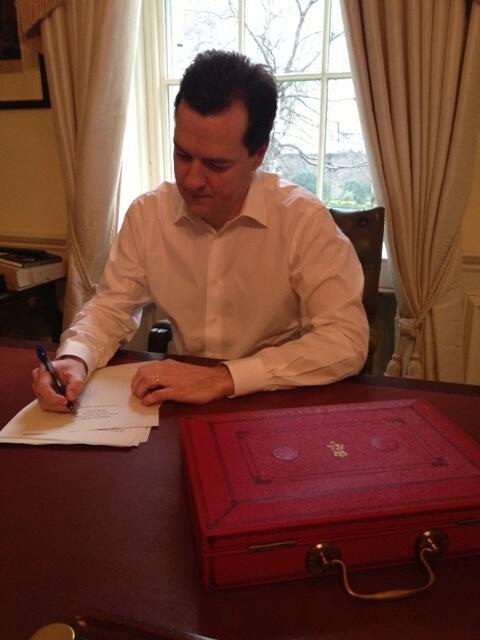As of about 8.15am, on Wednesday 20h March 2013, Gideon 'George' Osbourne joined the quagmire of nonsense that is Twitter. Not that anyone will really care after about 5 minutes of realising and once they've sent one tweet expressing their opinion of him. His first foray into the muddy waters was a brief, not overly insightful and rather self-indulgent:
'Today I'll present a Budget that tackles the economy's problems head on helping those who want to work hard & get on'
It was made worse by the use of this picture as an accompaniment:

I won't spend any time attempting to present some form of analysis of the picture, how it's structured or what it says about Gideon's PR people. I'll just settle for stating the obvious; it's clearly faked as no one can actually write with a suitcase on their desk. He's also holding his pen next to a typed section - with no sign of wet ink in sight - but I'm going to leave the analysis to the experts/ obsessives/ people who have nothing better to do than write sprawling blog entries about politicians vague attempts to engage with the public.
I'm not entirely sure what to make of the decision taken by Gideon's team to introduce him to Twitter, or what effect they think it'll have on his non-existent popularity. If anything it'll just give people an easy avenue through which they can vent their fury at the 'verified' account of one of the many incompetent people charged with the job of running the country.
Not that Gideon's team would ever let him actually look at the replies for fear of him feeling bullied and wondering 'why the peasants don't like what I'm doing'.
So as to not disregard all analysis, I should point out that what I can skim from the phrasing of this introduction, notably the reference to 'work hard and get on' aside from opening up possibilities for cheap innuendo, is that it's a phrase which will please the right-wing press as it'll mean they can say 'OSBOURNE ATTACKS BENEFIT SCROUNGERS IN BUDGET'. This is somewhat ironic given the stereotypical demographic of such newspapers.
I am also glad that he is hoping to present a budget which will 'tackle the economy's problems' as if there was another option; 'a budget which won't really help anyone except those who are too rich to care, like me'. It is after all, the job of the Government to make sure that things don't go all Greek over here. Or Spanish, Portuguese, Icelandic...
Ultimately though, I do rather wish that politicians would spend less time attempting to interact with people via social networks and spend more time getting on with the job which they are paid to do. A shocking and controversial opinion I know. If this latest foray into the 21st Century is being thought of as an attempt to 'digitalise' those in power and 'engage with the big web of chatter' that is the internet. Then I must once again ask you this; do you really think that anyone who doesn't already follow the news either online, television, radio or print will somehow be introduced to Gideon now that he's come down to their level? I doubt it.
I like to have some insight and analysis with my news, and I don't always like it to come straight from the horses mouth, as by the time it's reached it there have already been numerous meetings to finalise each and every syllable which he will then say to the press such that it needs an interpreter to actually work out what was 'not' being said. There's going to be hundreds of blogs about Gideon, Twitter and the Budget today.
Isn't the internet fun.